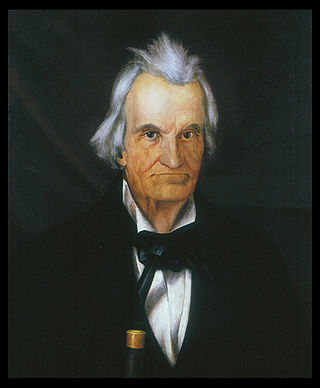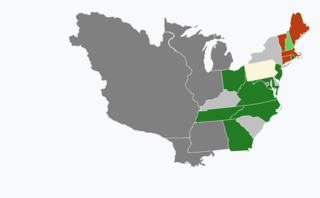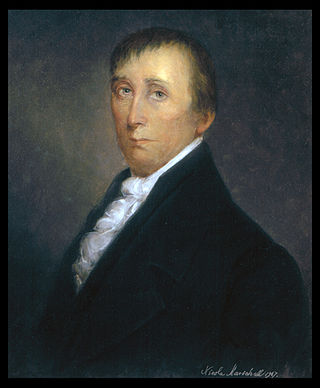
The governor of the Commonwealth of Kentucky is the head of government in Kentucky. Sixty-two men and one woman have served as governor of Kentucky. The governor's term is four years in length; since 1992, incumbents have been able to seek re-election once before becoming ineligible for four years. Throughout the state's history, four men have served two non-consecutive terms as governor, and four others have served two consecutive terms, the most recent being current governor Andy Beshear, who was re-elected to a second term on November 7, 2023. Kentucky is one of only five U.S. states that hold gubernatorial elections in odd-numbered years.

Solomon Porcius Sharp was an American lawyer and politician, serving as attorney general of Kentucky and a member of the United States Congress and the Kentucky General Assembly. His murder by Jereboam O. Beauchamp in 1825 is referred to as the Beauchamp–Sharp Tragedy or "The Kentucky Tragedy."

John Adair was an American pioneer, slave trader, soldier, and politician. He was the eighth Governor of Kentucky and represented the state in both the U.S. House and Senate. A native of South Carolina, Adair enlisted in the state militia and served in the Revolutionary War, during which he was twice captured and held as a prisoner of war by the British. Following the War, he was elected as a delegate to South Carolina's convention to ratify the United States Constitution.

Thomas Metcalfe, also known as Thomas Metcalf or as "Stonehammer", was an American politician who was a U.S. Representative, Senator, and the tenth Governor of Kentucky. He was the first gubernatorial candidate in the state's history to be chosen by a nominating convention rather than a caucus. He was also the first governor of Kentucky who was not a member of the Democratic-Republican Party.

Joseph Desha was an American politician who was a U.S. Representative from Kentucky from 1807 to 1819 and the ninth governor of Kentucky from 1824 to 1828. After the revocation of the Edict of Nantes, Desha's Huguenot ancestors fled from France to Pennsylvania, where Desha was born. Eventually, Desha's family settled near present-day Gallatin, Tennessee, where they were involved in many skirmishes with the Indians. Two of Desha's brothers were killed in these encounters, motivating him to volunteer for "Mad" Anthony Wayne's campaign against the Indians during the Northwest Indian War. Having by then resettled in Mason County, Kentucky, Desha parlayed his military record into several terms in the state legislature.

The Old Court – New Court controversy was a 19th-century political controversy in the U.S. state of Kentucky in which the Kentucky General Assembly abolished the Kentucky Court of Appeals and replaced it with a new court. The justices of the old court refused to recognize the action as valid, and for a time, two separate courts operated as the court of last resort for the state.

The 1828 Kentucky gubernatorial election was held on August 4, 1828.

United States gubernatorial elections were held in 1800, in 11 states, concurrent with the House, Senate elections and presidential election.

United States gubernatorial elections were held in 1801, in 13 states.

United States gubernatorial elections were held in 1803, in 12 states.

United States gubernatorial elections were held in 1804, in 13 states, concurrent with the House, Senate elections and presidential election.

United States gubernatorial elections were held in 1810, in 13 states, concurrent with the House and Senate elections.

United States gubernatorial elections were held in 1806, in 10 states, concurrent with the House and Senate elections.

United States gubernatorial elections were held in 1805, in 13 states.

The 1820 Massachusetts gubernatorial election was held on April 3, 1820.

The 1808 Massachusetts gubernatorial election was held on April 4, 1808.

The 1820 New Hampshire gubernatorial election was held on March 14, 1820.

The 1816 Kentucky gubernatorial election was held on August 5, 1816.

The 1832 Kentucky gubernatorial election was held on August 6, 1832.

The 1824 Kentucky gubernatorial election was held on August 2, 1824.























